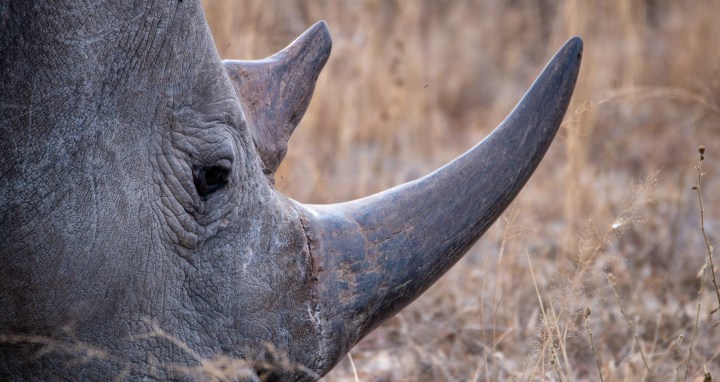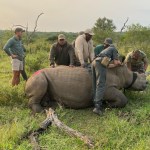WORLD RHINO DAY
Saving rhinos is a litmus test for tackling organised crime and corruption in South Africa

In the 11 years since one of the world’s most-wanted rhino poacher was arrested, thousands of rhinos have been killed, while the issue has faded from the headlines. But there are signs of hope.
Julian Rademeyer is director for east and southern Africa at the Global Initiative Against Transnational Organised Crime and author of Killing for Profit – Exposing the illegal rhino horn trade. Dr Jo Shaw is senior manager of the Wildlife Programme at WWF South Africa and African Rhino Lead for the WWF network.
Eleven years ago today, Dawie Groenewald, a little-known ex-policeman turned hunting safari operator, was arrested on charges of masterminding a lucrative rhino horn trafficking network involving professional hunters, vets and a pilot.
A police spokesperson described the case at the time as “a huge stride in our undying efforts to thwart rhino poaching”. The charges brought against Groenewald involved illegal hunting and the alleged killing of more than 50 of his own rhinos, dealing in rhino horns, money laundering, racketeering and fraud. Groenewald’s arrest was lauded as an example of South African law enforcement agencies collaborating to target wildlife criminals.
Yet, more than a decade on, Groenewald’s notoriety as “the world’s most wanted man when it comes to rhino horn trafficking” and “one of South Africa’s most notorious alleged rhino syndicate bosses with a genius for staying out of jail” has only grown.
That case remains unresolved, lurching year after year from one postponement to another. One of Groenewald’s co-accused is dead, charges against another were dropped and a constitutional challenge has upended parts of the indictment. A conviction looks increasingly tenuous.
In July this year, Groenewald was arrested yet again: this time in a police sting operation while allegedly trying to sell 19 rhino horns. (Last Friday, Groenewald and his friend and co-accused AB Steyn appeared briefly in court in Mbombela and the case was postponed to 10 December.)
The Groenewald cases book-end the first decade of South Africa’s rhino poaching crisis. In 2010, when he was first arrested, rhino poaching was front-page news; 333 rhinos had been killed by poachers, more than double the previous year’s toll. A new wildlife crime desk had just been established at the Hawks to investigate poaching networks and rhino horn trafficking involving Vietnamese nationals.
In the 10 years since, 9,885 rhinos have been killed across Africa and the issue has all but faded from the headlines. South Africa remains home to the vast majority of the world’s rhinos and is at the centre of the storm with hundreds of incursions by poachers into reserves, particularly the Kruger National Park, every year.
Poaching in South Africa peaked in 2014 – the worst year on record – at 1,215 incidents. Last year, 394 rhinos were killed by poachers in South Africa, the lowest figure since 2010, attributed in large part to Covid-19 lockdowns and travel restrictions. But as restrictions ease, poaching incidents are on the rise and in the first six months of this year, 249 rhinos were poached.
Some countries continue to make inroads against poaching. In Namibia, rhino losses were curtailed from 97 incidents in 2015 to just nine in the first seven months of 2021 as a result of cooperation across government agencies, the private sector, NGOs and civil society to investigate and prosecute wildlife crimes and support for wildlife from local communities.
The last decade has also come at great human cost. Soldiers, police and rangers have lost their lives. A police colonel investigating poaching syndicates was assassinated. Others are struggling with the terrible psychological toll of lives lived on the frontlines of an undeclared conflict. And hundreds of young men, often the primary breadwinners in their communities, have been jailed for poaching or shot by rangers and police in national parks and private reserves.
In South Africa, several strategies have been developed over the past decade in efforts to counter poaching, including a wide-ranging national law enforcement strategy on wildlife trafficking drafted in 2015 after a broad consultation process involving the security cluster, the Hawks, National Prosecuting Authority, SANParks, NGOs, the Department of Environment, the Department of Defence and the State Security Agency, among others. To date, despite being unveiled to some fanfare at the Cites CoP in Johannesburg in 2016, it has yet to be approved by Cabinet.
Earlier this year, a report by a ministerial panel appointed to review the policies, legislation and practices on matters related to management, breeding, hunting, trade and handling of elephants, lions, leopards and rhinos presented an ambitious vision of rewilded natural landscapes that would contribute to a transformed and sustainable wildlife sector. Experienced conservationists have echoed the need to reimagine rhino conservation in South Africa and find practical incentives, with others promoting the use of stewardship and safe strongholds.
However, the struggle to save rhinos will require more than effective site-based conservation.In many ways, efforts to counteract rhino poaching are also a litmus test of South Africa’s ability to tackle broader organised crime and corruption challenges.
Trafficking of rhino horn is inextricably linked in some cases to other criminal economies and networks. Take for example the case of Petros Sidney Mabuza, also known as “Mr Big” or Mshengu, who was gunned down in a suspected hit in Hazyview, Mpumalanga, in June this year. His criminal activities are reputed to have extended to ATM bombings, cash-in-transit heists and even murder. His notorious associate, an ex-policeman like Groenewald, is also due back in court today in Skukuza, facing poaching-related charges that date back a decade.
Thus, stopping rhino poaching is as much about combating organised crime as are efforts to dismantle syndicates driving drug trafficking, arms smuggling, cash-in-transit heists, gold robberies and human trafficking.
Rhinos are viewed across cultures as symbols of strength and power – as evidenced by hundreds of company logos and everyday references to the thickness of their hides. As adults, rhinos have no natural predators, except humans. Yet a two-tonne white rhino bull is as defenceless in the face of a gun as we are.
The threats rhinos face are ultimately symptoms of far deeper ills afflicting South Africa: the shocking socioeconomic disparities that persist 27 years after the country’s first democratic elections; corruption that has become deeply embedded into the very fabric of society; the cancerous spread of organised crime and the steady erosion – particularly in the past decade – of police units, intelligence and security structures, the Revenue Service and the prosecuting authority, among others. This affects us all. The damage done will have far-reaching implications for years to come.
It is a bleak picture and one that can quickly overwhelm and dishearten, but there are persistent glimmers of hope. South Africa has some truly remarkable wildlife champions; dedicated police officers, rangers, investigators, prosecutors, private security companies, conservationists, veterinarians, reserve managers and game farmers, who despite the odds and a lack of resources and political support give their all to achieve extraordinary things in extraordinarily difficult circumstances.
In the absence of well-functioning formal structures and strategies to address organised crime in South Africa, they have joined forces in their efforts to disrupt poaching syndicates. At national and local levels, environmental investigators, protected areas and conservationists are collaborating and adapting to create their own information-gathering systems and share tools and knowledge. The re-opened Skukuza Court is proving its local effectiveness, with sentences totalling 105 years handed down for poaching activities earlier this month.
Elsewhere, public-private partnerships have shown promise, building on the strengths of different players to meet skills gaps. The lifeblood of any business or crime syndicate is its cash flow. Increasingly, banks, working with government agencies including asset investigation units, financial intelligence centres, financial task forces and NGOs are turning their attention to investigating illicit financial flows fuelling wildlife crime.
Borders, bureaucracy and a tangle of divergent laws and legal jurisdictions are a boon to transnational criminal networks and a bane to law enforcement agencies trying to stop them.
There are indications of improved collaboration between law enforcement agencies in Africa and their counterparts in China, a primary destination and market for rhino horn. And some Chinese authorities, notably the China Customs Anti-Smuggling Bureau, have demonstrated a willingness to act on the information shared by NGOs like the Environmental Investigation Agency. Authorities in South Africa and Vietnam, another key rhino horn consumer and transit country, collaborated earlier this year in investigating a seizure of 139kg of rhino horn and 3.1 tonnes of animal parts suspected to be lion bones. But much more can be done and China and Vietnam have pivotal roles to play.
Protected areas have a complex legacy in South Africa, and some believe the tarnished history between people and parks contributes to the strength of wildlife trafficking syndicates. One way to rebuild faith in law enforcement in rural areas would be to show how law enforcement strategies to combat rhino poaching syndicates can also ensure that communities become safer and more resilient – by breaking up these networks, cracking down on corruption and creating a climate with opportunities for socioeconomic development.
Investing in well-functioning conservation areas can create beacons of best practice for improving anti-corruption efforts, law enforcement and governance, not just for rhinos, but in a way that can benefit people living around parks in shared rural safety plans. This can help create safer communities in remote areas where law enforcement is weak due to resource constraints, the vast distances covered by rural police stations and ever-present corruption.
Dedicated individuals, conservationists, environmental agencies and civil society alone cannot plug the gaps which allow organised crime to flourish. It will require a concerted effort by the government of President Cyril Ramaphosa to undo the immense damage done to law enforcement, security and anti-corruption agencies over the past decade and develop the dynamic skill sets, intelligence capacity and strategies needed to investigate, prosecute and dismantle organised crime networks. In this sense, efforts to save the rhino act as a barometer for the effectiveness of the state to protect its people too. DM
To register for the Rhinos in Crisis webinar on 22 September, click here.



















 Become an Insider
Become an Insider
Comments - Please login in order to comment.